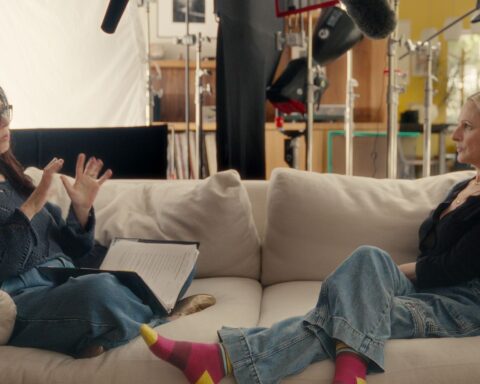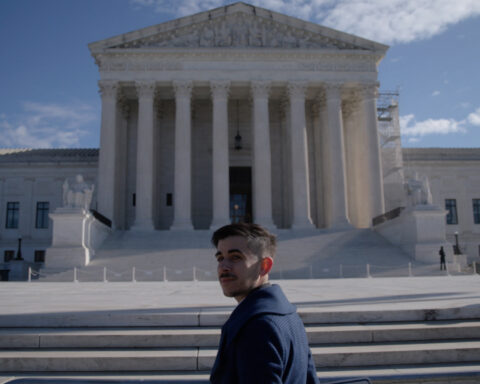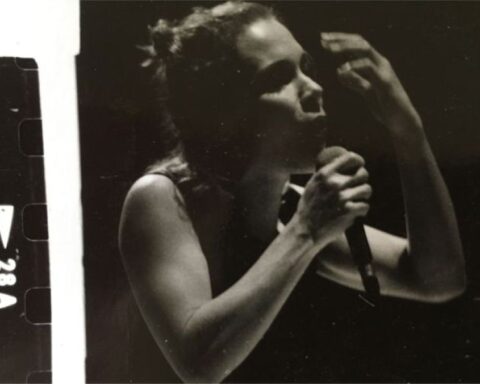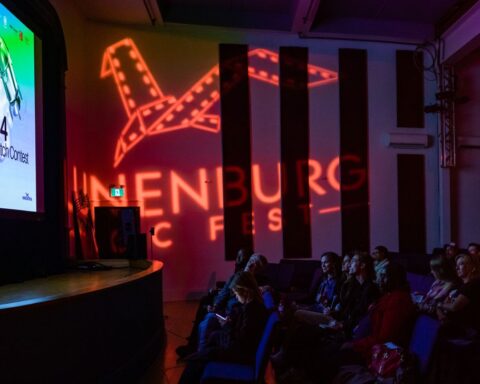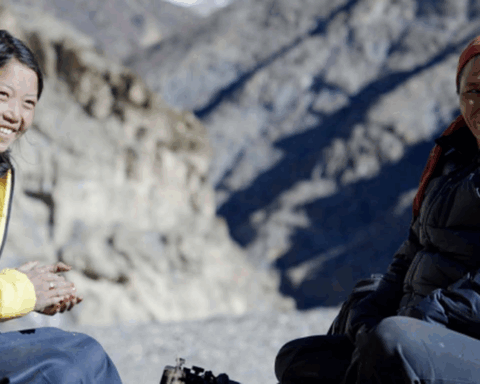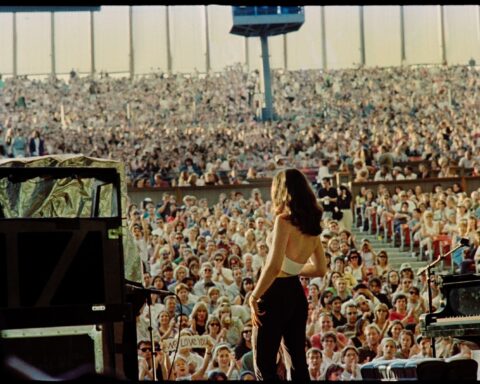Best known for his Academy Award-shortlisted documentary Facing Ali (2009), Vancouver-based director Pete McCormack also made two Leo Award-winning films, the feature See Grace Fly (2003) and the documentary Uganda Rising (2006). Last year, he created the popular, six episode doc series Sports on Fire for HBO Canada. McCormack’s latest feature documentary film, Spirit Unforgettable, premiered to critical acclaim earlier this year at Hot Docs. (Read the POV review of Spirit Unforgettable here.) It depicts the popular Vancouver band Spirit of the West’s final Toronto concert at Massey Hall, after the group’s singer and guitarist John Mann announced that he had to retire due to early onset Alzheimer’s disease.
Pete McCormack is also a musician and a Leacock Award-nominated novelist. Before Spirit Unforgettable screened at VIFF, he agreed to a written interview about his poignant film. — Nancy Lanthier
NL: Nancy Lanthier for POV
PM: Pete McCormack
NL: Why did you make this film?
PM: I have had the good fortune to know most of the members in Spirit of the West since the early ’90s. Without John knowing me personally, he had spoken publicly about my first novel being the Canadian Catcher in the Rye — it wasn’t but I loved him for saying that. And members of the band had played on my albums back then, just because they are generous guys. Their brilliant drummer Vince Ditrich played on everything I recorded, so we became great friends and have remained so. Fast forward to 2014. Being close to John, I knew about his condition before the public revelation of the diagnosis, and around that time, Vince had mentioned the idea of a documentary.
I ruminated about it a lot. I had actually committed to not doing another one-off feature documentary but both the band and John deserved to be celebrated, and have their story told. Then once I said yes, I knew I’d have to get on it right away—using my own money to start—because of how John was struggling already, and the unknowns around the progression of this awful disease. So we did the first interviews in November 2014.
NL: In the film, band members say, being with John “was a chance to watch courage.” But did you ever question the project? Were there times when filming a man with Alzheimer’s became too difficult?
PM: The hardest part about the process was simply having a dear friend of great charisma and talent deal with this awful disease. I just adore and admire John and the band, and their artistry, and their families. Suffice to say, I did not approach the making of Spirit Unforgettable as I would normally with a film: passionate and obsessive but somewhat detached. Instead, I was attached emotionally and socially. So I just captured what I could, and tried to make the film be as honest as possible. It was a tender experience.
There was great power in some of the interviews and moments, and with this band, often humour, and, of course, Massey Hall was breathtaking on different levels. But the most powerful experiences for me came when John was in hospital settings, getting MRIs, getting news about the condition of his brain. I filmed that without a crew, using my Canon 5D with a little monitor on top and a Zoom audio recorder and a tripod. I needed to be quiet on multiple levels, and simply listen, and catch what I could and do everything to not be in anybody’s way. It was humbling and an honour and intimate and emotional. Before even filming on those days, I would pick up John and his wife Jill Daum and sort of chauffeur them in my car to wherever we were shooting. That was a powerful time. Just to be with them. I felt protective, and I felt the vulnerable depth and rhythm of those days, and, of course, I felt the ache of their pain. But mostly, I simply loved them. And John has been extraordinary in terms of mood, joy, courage to perform and to push on. I wish it didn’t have to be as it is, but given that it does, John has been deeply inspiring.
NL: When you started the film, there must have been many risks and questions. Would you put all this work into a project and then be unable to finish it? Would the Massey Hall concert be a fiasco? Was there a sense of urgency making the film? As a viewer, I felt suspense right from the start. As a filmmaker did you feel this too?
PM: With this film, objectivity, and so-called bias, were not much a part of my inner conversation. We had a small, great team, and I did what I had to do as a director—the research, the relentless pursuit of archive, the push to get what was needed artistically and narratively. But I didn’t want any visions of film grandeur to make me push over the ethical line—although there are no rules to what that ethical line is, only instincts. I just didn’t want to do or film anything that might hurt John. At the same time, I thought it was absolutely essential to the film and felt an obligation and responsibility to John to really capture his voice, what he was going through.
As for whether the concert at Massey Hall would or would not pan out, I didn’t worry about it. We spent the money for the shoot and were prepared for whatever unfolded. With documentaries, you take what you can, you get what you’re given, and you hope you have enough b-roll. At the same time, as a friend and a fan, I felt the suspense and longing that the performance would be edifying and redemptive. In the off-stage makeshift film booth during the concert—it was a nine-camera shoot—I found myself both crying and punching the air during big moments.
NL: Did you and John discuss how you’d go about exploring his disease? It’s so hard to get inside a person’s brain. Then you try to get inside a brain with Alzheimer’s; that must have been challenging.
PM: John and I did not discuss how to go about revealing the inner journey of the disease because he was no longer able to freely communicate on that level. I knew it was easy for John to say Alzheimer’s “feels” sad, but it is a whole different challenge and puzzle figuring out how to get inside the brain of a person with a brain disease to find out how the disease is actually experienced; what do they see when a name or a face isn’t recognizable, or words won’t come? Because of the nature of the disease itself, this hasn’t been asked or answered too much.
So I tried several things: music as a means to trigger John’s memory. That ended up revealing certain other realities, but not memory so much.
I also left a big sheet of construction paper at John’s house, with simple questions written on it and a pen attached to the paper by a string so if John wanted to answer any of the questions, it was right there. Interestingly, they were also answered differently than how I would have expected—but how they were answered said so much, and was moving and shattering.
Another attempt took place through a ‘fictional’ play Jill was writing about living with Alzheimer’s. One section in the play had the character describing what Alzheimer’s was like to experience physiologically. The lines had come directly from what John had said in the recent past to describe the way the disease feels. I re-jigged that writing on the page a little, changed the pronouns back into John’s voice and cut out any other characters, and handed these lines back to John to read. When he read them, he was immediately overcome, like he was saying the words for the first time. It was intensely real, and heart breaking, and the information he gives us so rare about the disease. I was profoundly moved.
So I tried many ways to reach inside John. And John was brave and open. This is no surprise. John is a courageous and confessional writer. He made an entire album—The Waiting Room—about his battle with colo-rectal cancer, which he had five years earlier. It has been an unfair run.
NL: Why is there so much joy in a story about an artist cut down in his 50s by Alzheimer’s?
PM: The members of Spirit of the West exude so many of what I consider the best Canadian traits, two being self-deprecation and the ability to find humour in the macabre—so joy flowed from there. This was a band that started out playing penny whistles, bodhran drums and bouzouki guitars and ended up being an iconic, beloved multi-platinum winning Canadian folk-pop band. Coming from those roots, you have to be laughing at some kind of absurdity, while not taking anything, including the music business, too seriously. And then there is the music itself. Spirit of the West plays such joyful music, with unbridled intensity and love.
NL: You tell a CBC reporter: “Dementia is not the end of your life. There’s a lot of living left.” Can you please elaborate?
PM: John taught me two vital things: one, the disease is more insidious than I thought. It is not just grandpa getting a little dotty and not being able to remember names. Alzheimer’s is relentless, and it takes so much away, and eventually everything. There is no known cause and no cure. So I believed the diagnosis was the end of one’s life. If you have dementia, that’s it. John taught me that there can be so much life left to live—even after the diagnosis of early onset Alzheimer’s. He has proved that—and continues to prove it. Although he is quieter now, he still loves being social. He kept singing. He kept performing. He kept saying yes to so many things, and that has been inspiring, and I love him for his courage. And I’ve learned with Alzheimer’s that when dialogue becomes difficult or impossible, there is still a lot of communication available through touch and eye contact and just being there. So I guess those are the silver linings. All I can say, ultimately, is I love the band, and John; I love their brotherhood. And I will always be grateful to have had the opportunity to make this film.




